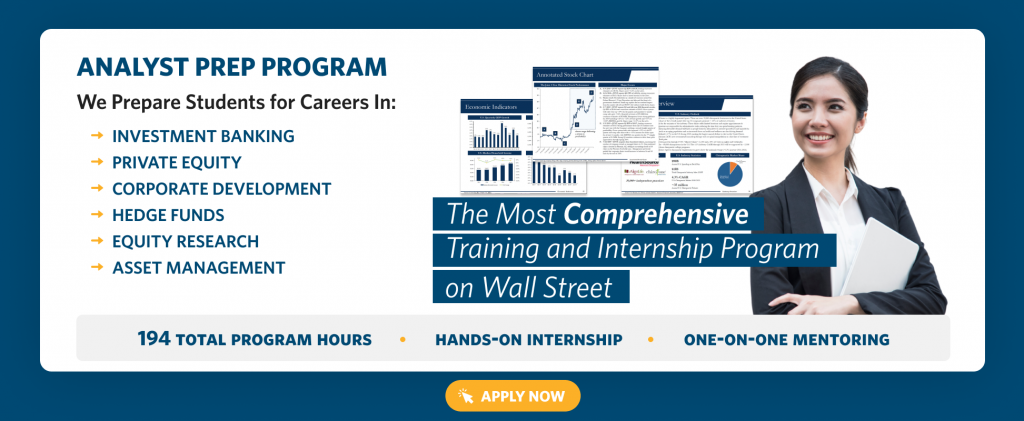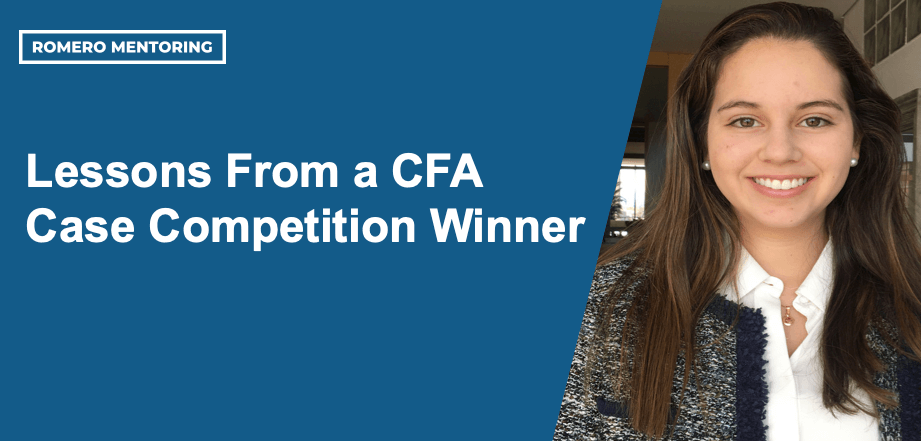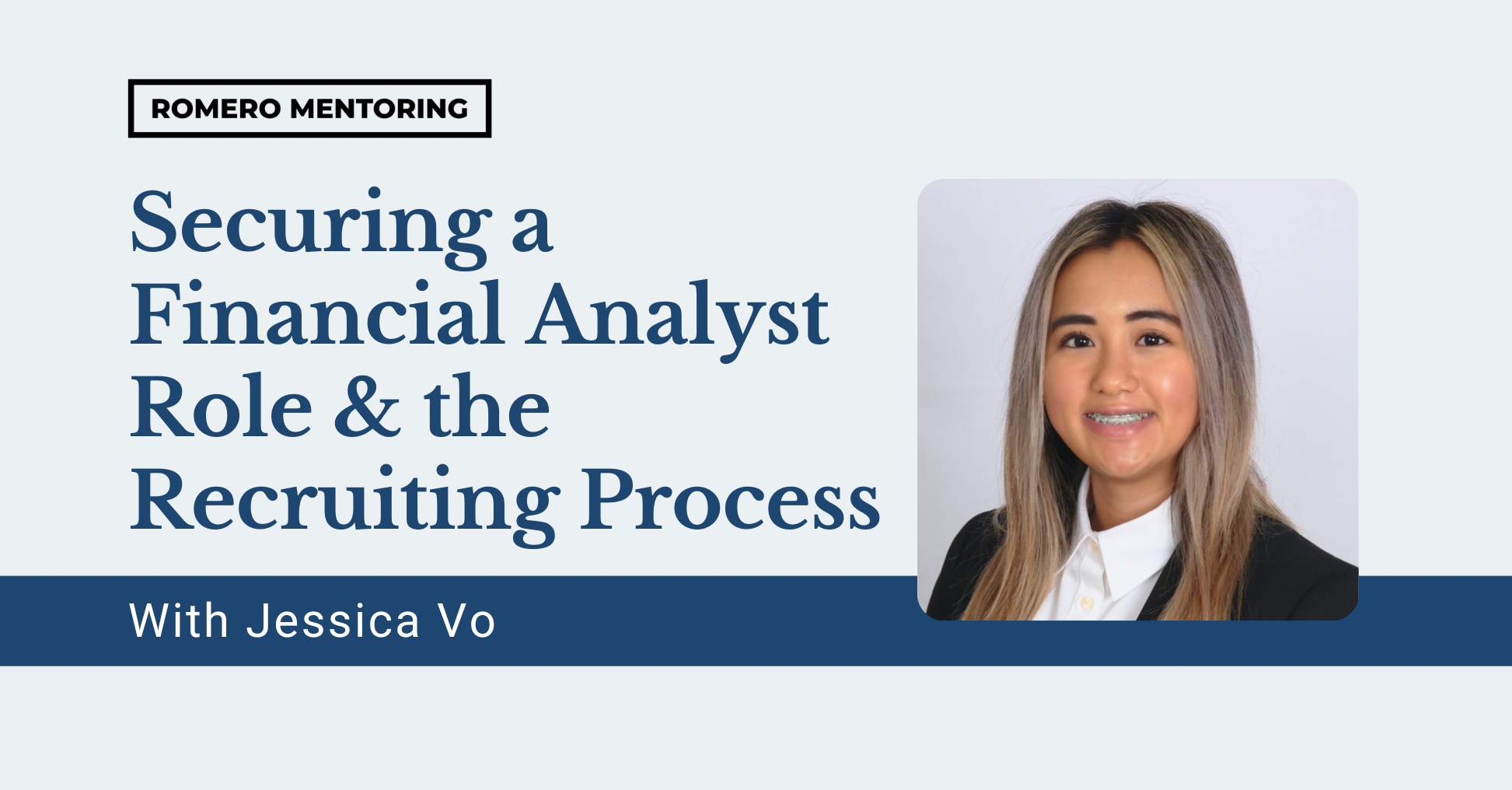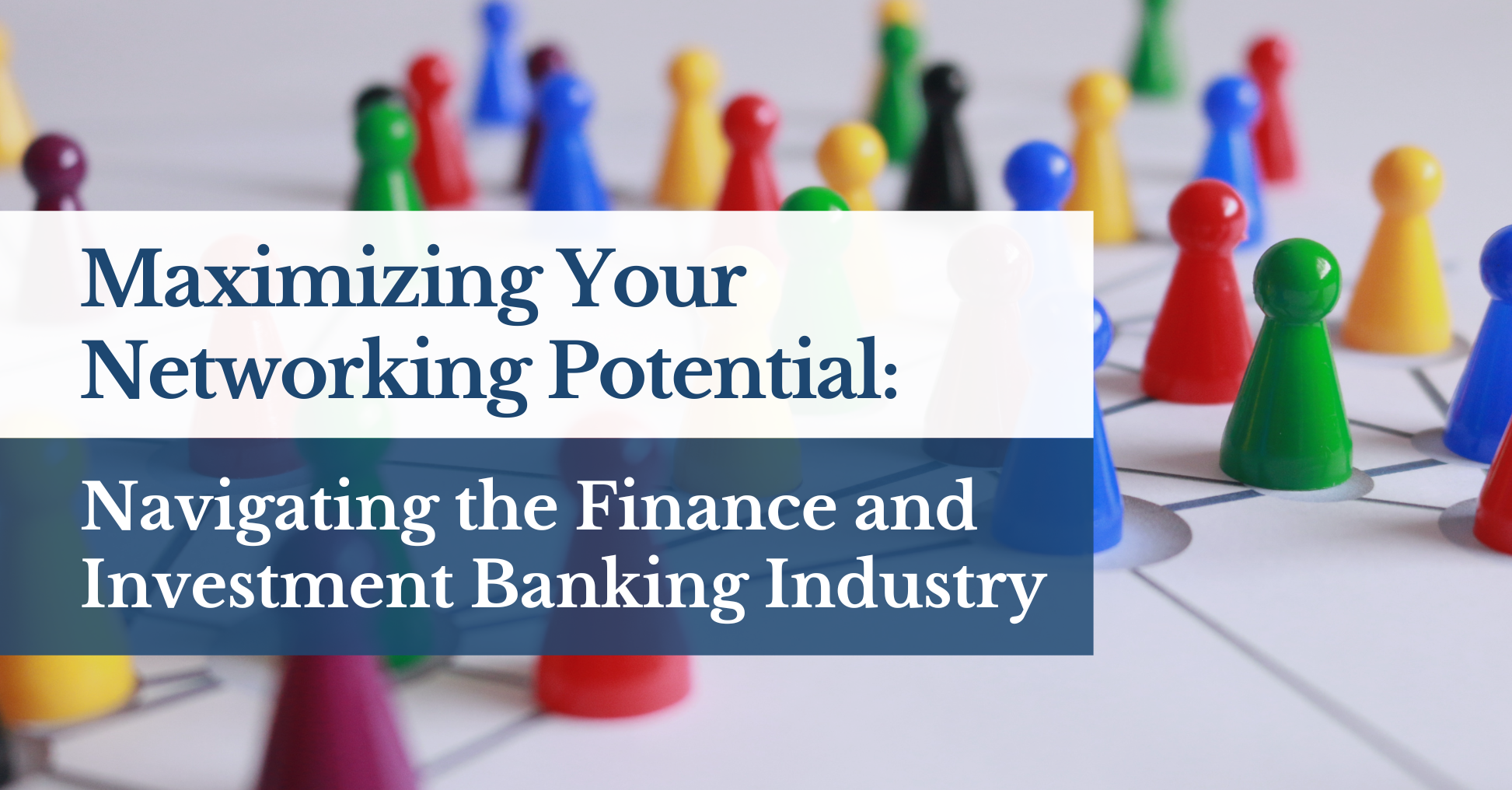We interviewed Andrea Hoyas, winner of the CFA Institute Research Challenge and a Romero Mentoring Analyst Prep Program alum. Thanks to the skills she acquired in the program, Andrea was able to lead her team to a case competition win. Andrea shares her story below, providing insight into her personal journey and professional development. We hope her story inspires students within the Romero Mentoring community.
Key Takeaways:
- Take initiative and learn to be a high performer.
- Develop a strong work ethic.
- Spend time to learn the hard technical and soft skills.
- Learn about yourself and grow your interpersonal skills.
1. Tell us about your story.
I am a Dalhousie University student, majoring in finance and minoring in economics. As a student growing up in Colombia within a family that engaged in various kinds of investments, I became very interested in business and investing. I would frequently analyze different potential new projects, uncovering mismanagement and bad decisions companies had made. This growing interest and constant exposure to investing and financial decisions is what led me to study finance in Canada, where I am able to expand my knowledge about investing at a global level.
Since childhood the importance of high performance and hard work has been instilled in me. This mindset encourages me to take initiative when researching new investment ideas, especially within natural resources, as well as pushed me to join the university triathlon group where I trained with dedication daily to achieve my goals.
As a student majoring in finance at Dalhousie University, I have searched for opportunities to expand my education through internships and career programs. My job experiences include working at CIBC Investment Banking & Capital Markets, where I demonstrated my abilities to think strategically and synthesize information quickly, which aided me when consolidating acquisition opportunities for investors.
In addition, my passion for learning inspired me to join Romero Mentoring. This program has given me the technical skills necessary to determine company valuations, generate investing analyses and deliver recommendations. I also completed an internship at Romero Capital, where I leveraged the skills learned during my training program to assist the portfolio manager in equity research by building models and making investment conclusions.
Using what I learned in the mentoring program, I decided to join the CFA Institute Research Challenge and represent my university against other Atlantic Canada schools in the completion of an equity research report on a Canadian telecommunication company. Thanks to the skills I had acquired in the program, as well as during the internship at Romero Capital, I was able to help my team determine the valuation of the company.
2. Why did you get started in finance?
My interest in finance began as a kid as I was constantly exposed to conversations about new investing opportunities and what companies were doing, particularly in the agricultural and natural resources industries. This led me to constantly seek ideas for businesses; I opened a candy business at school and later I engaged in bigger research projects for the development of a new investment for my family’s company.
3. What are your career goals?
My career goals are to continue my path in investing and to grow as both a professional and as a woman in the finance industry. I hope to assume a leadership role where I am not only challenged, but where I can also make a big impact within the organization.
4. Tell us about the CFA case competition.
The CFA Institute Research Challenge is a competition between university-sponsored teams that research a designated publicly traded company, prepare a written report on that selected company, and then present their findings to a panel of judges. The competition has three levels: local, regional, and global. It is aunique educational opportunity to apply what you have learned in the classroom to real-world practice in equity research.
5. What company was the case on?
Bell Inc. (BCE), a leading telecommunications company in Canada.
6. What was your investment thesis?
The investment thesis for Bell Inc. (BCE) was a buy recommendation due to the internal characteristics of the company such as higher subscription and revenue growth than peers, higher EBITDA margins and better positioning for launching new technologies like 5G. The company is a low beta, high dividend yield stock that would be a good opportunity in a looming recession. Additionally, the industry as a whole is very well placed as a telecom oligopoly with high barriers to entry of which Bell is a major player. Within the industry, players have a tendency to partner up with competitors to react to regulatory threats and are well placed on mitigating risk. Bell’s constant reinvestment of capital to steer growth is a good indicator of the company’s good management that adapts to a changing environment where new platforms like Netflix are replacing some wireline cable services. Bell also has a good management team with well-respected professionals and a historical reputation of good judgement and decision-making. Our valuation also indicated that the company is slightly undervalued with an upside of 11.5% including dividend yield.
7. What skills did you incorporate in your analysis?
I was able to incorporate all the skills I learned during school and during work terms, but most of all I used the skills that I learned during my internship at Romero Capital. I was able to complete industry due diligence and be in charge of performing the company valuation. Because my teammates had no previous experience in valuation, I was able to aid them with the technical details while they focused on other in-depth analyses that helped make the assumptions for the model. The valuation process was completed exactly in the same way as it was done during my program where I did due diligence, made assumptions, used a DCF (discounted cash flow) model and comparable multiples valuation.
8. What do you think set your team apart from others?
I think our team was a great mix of very experienced, smart and committed students who worked well together and put in the same amount of effort equally. I think our understanding of the company, industry, environment, and risks set our team apart from others, as well as the concise, easy-to-understand explanation we included in our research presentation.
9. As a Romero Mentoring Analyst Prep alum, how did the program prepare you for the competition?
Thanks to the skills I learned during the Romero Mentoring Analyst Prep Program, I was able to understand everything that we had to do and include in our research report, which gave us a good start in the case. Once we divided our work and decided to specialize in what we all did best, I was able to construct the model and the DCF accurately and with a facility that my peers didn’t have as they hadn’t been previously exposed to it.
Not only did the program help me by giving me the technical skills necessary to complete the model, but I was then able to really analyze and understand why things were happening within the company and their trends, which helped the whole team to understand the dynamics of the company and its industry. The program really allowed me to see the big picture and share my ideas and thoughts with the rest of the team in order to have a clear investment recommendation and thought process.
10. Which valuation methodologies did you apply?
DCF and relative valuation using EV/EBITDA, EV/Sales and P/E multiples.
11. What advice do you have for future case participants?
I would recommend future participants take advantage as much as possible of the Romero Mentoring Analyst Prep Program, as it’s an investment in yourself and your future growth. You get out of the program as much as you want to put into it, so it really depends on how committed you are and interested in following a finance career. Apart from the program, I would suggest that students not stop there, but instead engage themselves in different cases or challenges where they’re able to apply everything learned in the program while also steering and boosting their growth and learning curve.
Romero Mentoring’s Analyst Prep Program

The Analyst Prep Program teaches the technical and practical skills that investment banks, hedge funds, and private equity & consulting firms look for in a candidate. Students begin with little to no technical skills and develop into fully prepared professionals who can perform as first-year analysts from day one through the program’s training and internship.
Our Story
Luis Romero, founder of Romero Mentoring, spent five years developing an analyst training program that he wishes he had when he was in college – especially one that gave him access to a complete training and finance internship experience that could advance his career. Since no opportunity like this existed to him at the time, Luis went through a stressful recruiting process like so many others have. He successfully landed a full-time job offer upon graduation and worked as an M&A analyst at Credit Suisse in NYC for two years. He then moved to the buy-side as a junior trader and analyst. After gaining experience there, he created his own fund, Romero Capital, and later become an instructor in financial modeling and valuation. After working with hundreds of professionals and analysts, Luis became committed to creating his own mentoring program because he understood the crucial need for a hands-on, personal experience in the competitive world of finance.





